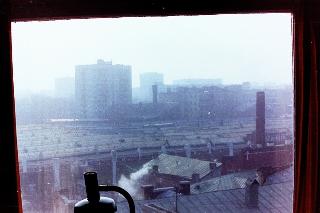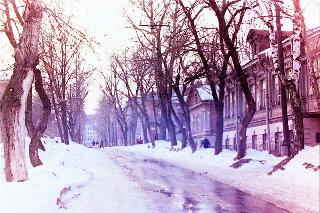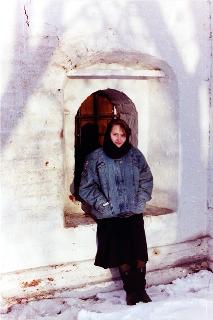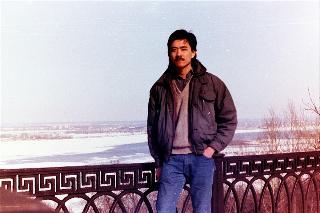
View from Akademiskaya room.
Four years ago I had spent seven hours in the transit lounge at the Sheremetyevo Airport outside of Moscow scarfing up beef and borscht that the meal tickets wrought. I was never fond of beets and airport food anywhere is hardly gourmet, but I was famished after a lengthy flight from Africa with deboarding stops in Dakar and Budapest. What really irked me was that I hadn't been able to get a Soviet visa because that month Gorbachev had called a Special Party Meeting. At least that's what their embassy told me in Freetown when I tried to take advantage of Aeroflot's offer to include three nights in a Moscow hotel if I flew through there. Later I found out that another returning Peace Corps volunteer on my flight had received a visa because she had a distant relative she was going to visit. I was jealous--all the other volunteers were doing their traditional post-Peace Corps wanderlust thing and I was heading straight back to graduate school like a feckless dog without even a peek behind the Curtain. Of course, I could only blame myself. But now I was determined not to make this trip saturate with business. I must regain a measure of fun I was cheated out of. Reach out for my fair share of freebies. Furthermore, I found out that Nizhny Novgorod was Gorky under the Soviets--a place closed to foreigners where secret defense research and manufacturing were conducted, the third largest city in Russia, prison to the dissident Andrei Sakharov when he was sent into internal exile. It would be exciting to go there so soon after its re-opening.
This development did not faze me much because (1) my Peace Corps years had desensitized my reactions to adversity on the road (the typically Sierra Leonean "No Condition is Permanent" bravado) and (2) I had everything vital in my knapsack, i.e, presentation material, contact lens stuff, and money.
Waiting for the baggage people to get their act together I met an American who was running a roofing business in Moscow. During an encounter with a compatriate in a foreign land you immediately try to locate a point of commonality (Hey, I have a cousin in Walla Walla. Maybe you know her...) that somehow legitimizes your banding together beyond the fact that you speak the same language. Ours happened to be that we had both been to Søndre Strømfjord, Greenland: he, to put up the roof on the Arctic Hotel; I, to make radar observations of the polar atmosphere. Then, of course, he asked about the ozone hole. I hate it when people do that. Because then I have to explain my own area of research, about PMSE and the mesopause and space plasma physics, fairly esoteric and abstruse subjects which don't attract much public attention, terminology that often suggests "female health problems in space" to inattentive listeners. Sorry, no ozone.
Finally I was taken up to the Delta office only to be notified that my bag never left New York and that it would not arrive until tomorrow.
We took off toward Moscow in a grungy Niva. Soon I realized that this adjective was redundant in describing all motor vehicles. Mud resulting from melting snow, puddles in the ubiquitous potholes, and the pervasive diesel exhaust have painted all autos a grimy gray from the ground up. Later at night I noticed that the normal setting for headlights was so dim as to make them look like fireflies. At first I attributed this phenomenon to the universal grunge factor but closer inspection revealed that it was by design--the luminosity that we are used to can only be attained by switching the lights to the ``high'' position. Distressingly, this could be taken to support the kind of trite thinking which holds that the particular neuroses of a society manifest themselves in the most mundane examples, e.g., the German mania for cleanliness appears in the form of standardized garbage cans which can be emptied into the truck by a mechanized lift so that the sanitation worker need not open nor heft the thing him/herself. The case of headlights could be read thus: in socialistic Scandinavia vehicle lights are hard-wired to turn on when the ignition is switched on, based on statistics that suggest fewer accidents occur if headlights are left on even in daylight; interpretation--social benefit overrides individual choice. This is in contrast to our country where helmet laws are controversial, many people never wear seatbelts, and, of course, I will turn on my headlights when I damned well please. The Soviet penchance for dimlitness could be attributed to luminophobia, where the people must be kept in the dark for their own good, brought to you by the same people who deliberately introduced errors into maps. Actually, it was probably a defense effort to make satellite detection of traffic movement more difficult at night.
I had read that Gorbachev was receiving a $25/month pension. Kazimirovsky showed no sympathy; he received even less as an active senior administrator. I don't sorrow Gorbachev. He has saved up hard currency.
We were moving into the outer edges of Moscow. The famously ugly monolithic concrete apartment buildings began to appear on both sides. Many people were ice fishing on the Moscow River. For food? No, for interest. Through the ring boulevards, humongous statues, glimpse of the golden domes of the Kremlin, hey, the Golden Arches, a bit futher--we were there: the Academy of Science Hotel.

View from Akademiskaya room.
By the way, the secret of the intermittent elevator was revealed to me by an Arab man (the hotel was full of scientists from formerly Soviet-patronized countries) who, when it halted, jammed his feet up against the wall, climber-like, suspending himself in mid-air. Sure enough, we started to move again. The answer: there was a weight sensor on the floor which kept the elevator from motivating when too many people piled in. Unfortunately it was indecisive, but fortunately(?) easily fooled.
My question was: Why was it going to take nine hours by a private bus to traverse the 400 km to Nizhny Novgorod?
It appeared that the road had preceded any development around it. Either that or they had bulldozed over everything in its path, because it was very wide and absolutely straight. At times there was a narrow zone on either side lined with incredibly tiny houses (the size of a large toolshed), each one picket-fenced in a rectangle barely larger than themselves. Behind the zone would be a vast open field stretching to the horizon. I was told these were the agricultural collectives. Why they were built so small, jammed together, and crammed against this noisy major highway was beyond me. It seemed as if all the advantages of rural living were negated in this arrangement.
Kazimirovsky sneaked up to me and handed me some papers. Please read this. We can talk about it later. Big smile, slap on the shoulder. What it amounted to was a proposal to set up a "sibling" relationship between his institute and mine (Cornell). It was something that was originally advocated by an association of American scientists as an effort to aid the scientific institutions in the former Soviet republics in their time of acute financial crisis (and, of course, to facilitate the flow of brainpower in our direction). This was a serious issue and one of the missions of our trip. I half-expected to start receiving "beg" letters like I did when I lived in Africa. But like then I felt pretty powerless; I was merely a graduate student--no authority, no political clout. The Russians didn't know this--they were assuming I was a young professor. I was beginning to feel like a free-loading cheat.
Lunch was passed around which consisted of slices of white and dark bread with salami, cheese, beef fat, boiled egg, a cucumber, crab apple, Baikal cola, tea, and vodka. Tea in Russian is tchai (as in Tchaikovsky), one of those nearly global words. "Cola" is likely even more universal now. However the recipe had apparently not disseminated so readily. I could see Danilov up front apologizing to heaven: Baikal is not like Pepsi... True. It tasted like carbonated Formula 44.
The rowdier types were gathering in the back with the vodka. I felt sleepy. Jet lag and vodka.
When I awoke it was dark. Apparently we were about to arrive. Someone pointed out a building in which Sakharov had been imprisoned for seven years. We crossed a long bridge, climbed up the embankment, and pulled up in front of a hotel. A sharp, frigid wind hit me as I stepped off the bus, reminding me that we had traveled further into the continental interior.
The footing in the snowstorm was extremely tenuous. I was used to Ithaca where even a dusting of snow brought out a legion of salt trucks (I was firmly convinced that they were being paid off by the local car dealers). Here there was a several-inch thick substrate of amorphous ice on the sidewalks. In fact, as we walked by, an old man was using a shovel to chip away at the solid layer. He must have started some time ago at the far corner--about ten yards of pavement had been revealed. Meanwhile, women in high-heeled boots were zooming past our stumbling group.

Nizhny Novgorod streetscape.
There were ten of us from the U.S.--university professors and government scientists (and me). There were also three from Sweden (who were from Germany, Hungary, and Norway, originally), and one from India. It was very sad to see only one woman (the Indian) in the visiting group, and just one non-white American. In contrast, there were a fair number of women among the Russians (although few seemed to be in positions of authority).
After the obligatory welcome and thank you session we settled right down to science. Luckily my talk was today; it's always a relief to get your performance out of the way early, and this time I worried that my only set of clothes would become fairly rumpled by the end of the conference.
From the beginning I sensed a level of attentiveness in the audience that I had not experienced before. Despite the fact that all the presentations were being made in English and no translation was provided, our hosts frequently braved the difficulty of formulating questions in an unpracticed tongue. Preprints and reprints of papers were eagerly exchanged during coffee breaks. One of the greatest problems facing the Russian scientific community was the lack of hard currency to subscribe to Western journals. This was true even for the institutes of the highest echelon. I was touched (and somewhat embarrassed) when I was asked to autograph a copy of my paper that I was giving away. It was not easy to communicate ideas. We often scribbled equations and diagrams on each other's notepads. But the level of excitement and enthusiasm was high all around.
As an added bonus, my talk was well-received and generated some discussion afterwards. Now my work was done and I could kick back and enjoy.
The Russians, over the years, had adapted to their technological handicap (esp. with respect to computers) by turning to "paper and pen" (i.e., analytical) theories and observational techniques that required crude but powerful equipment. Old methods that we had abandoned a long time ago (which I never learned in school) were still being used here. The one big exception was their rocket program. Joint sounding rocket campaigns (like the one I was involved in last summer in Sweden) would be an ideal arena for mutual scientific benefit. Existing Russian rocket ranges and vehicles could be funded and upgraded by us, then they would be available to the international scientific community at extremely competitive costs.
Stratospheric ozone was a major area of research there (as it is everywhere else (and rightly so, EVEN THOUGH IT'S NOT MY FIELD)). They had observational stations in the arctic as well as the antarctic. I learned from Olga, a staff member at the institute, that women were not allowed to go to Antarctica. However, she was obviously proud that she had been one of the few women to make measurements on Heiss Island in the Barents Sea.
Of course, science was only part of the dialogue. We were constantly reminded that the sort of budgetary problems we were having back home were purely pedestrian compared to the financial catatonia into which their institutes of basic research had plunged. They needed our help. And they were telling us in no vague terms. Even though there was much good will and enthusiasm generated by the workshop, I could perceive the underlying pessimism and bitterness that the abrupt political and socio-economic upheavals have wrought. You could hear it in the voice of Eduard Kazimirovsky, the toastmaster at the conference banquet, as he quipped To a free country--"free," as in "no money." Or Alexander Pogoreltsev, an ethnic Russian from the Kazakhstan Ionospheric Institute lamenting We are cut off from Moscow now. I don't know how we are going to survive.
Still, there were the energetically visionary types. Vladimir Chernyshov was advertising the launching of a new journal called The Sun. It would be a Russian/English publication which would be open to contribution from around the globe as long as it had anything to do with solar research. The boundaries were stretched even to include poetry, fiction, and personal reflections of the sun-minded. The truly incredible part was that he expected to pay the contributors (in hard currency) by selling advertisement space. This was the reverse of purely scientific journals which charged the authors publication fees. Also, Vladimir Zorin of the Applied Physics Institute Mountain Club was offering organized expeditions to the Caucasus for $600 to $2400. Living in an extremely turbulent society, I suppose one has little to lose by making bold moves, since passivity will more than likely lead to dissipation.
One thing was beginning to irritate me, though. (No, not my clothes. I had borrowed a set from another American (there were only a couple whose dimensions were anywhere near mine, i.e., decidedly vertical) and washed my own). The organizers had been so thorough as to leave no free time for individual exploration. This was a fundamental deprivation for an American, especially of my temperament. They were also definitely over-protective and maybe even paranoid about one of us getting lost or harmed in any way. They were concerned that crime had drastically increased in the last year. You asked them where you could buy a postcard, then they would say something like Oh it would be hard for you to find them, and the next thing you know they've gotten a whole pack from somewhere and given them to you for free. Look, man, I can take care of myself. Such was my condition when I went to one of the predetermined events: a concert at the art museum.

Tatiana (Tanya).
The staircase and hallways were unlit because most of the lightbulbs had been taken and never replaced. The elevator was defunct. Lounge areas were totally devoid of furniture and the air was damp and slightly fetid. It was as if I had stepped into a passage from The Trial. Her room was at the end of a cul de sac and I waited outside as she went in first to forewarn her roommates.
This was a small room--about the size of a single in a typical American dorm. Wall shelves were used extensively to minimize the floor space taken. Two desks (one occupied), a bed, a curtained off bunk space out of which a woman crawled out saying I was sleeping and I heard English, an electric hot plate, a sack of Chinese rice, plates and silverware, a guitar, photos taped to mirrors, not much jewelry. Even though all three were English majors, not many of the shelved books were in English. Julia and Anna were animated. Where did you find our Tanya? The only American they had met previously was a visiting teacher in a class. He did not like Russian food; he had many jars of peanut butter out of which he ate regularly. They knew because they had visited his apartment. Then they proceeded to explain to me in detail what the labels looked like. I had to explain that there were many different brands of peanut butter in the U.S. Because the cafeteria was not operating anymore they cooked their meals here with the hot plate, mostly "macaroni" and rice. Then they wanted to entertain me with music, Julia singing and strumming the guitar, Anna harmonizing. They liked "romance" songs, Roberta Flack being their favorite. They were comtemptible of the "metallists" who played very noisy music. After a while, a guy wandered in asking to borrow the cassette player which was the communal boom box. Handing over her guitar, Julia convinced him to play a few Beatles songs before he took off. He knew the riffs well; and I was impressed with how familiar they were with the lyrics, much more so than I was.
Tanya asked her roommates for dining suggestions. There weren't too many options: a couple of hotels, one of in which I was staying, the Gardinia Restaurant, and the Russian Club. I had already noticed the Gardinia, a tacky structure that looked like an In-N-Out Burger stand on the embankment, flying a large American flag overhead. It was a newly opened fried chicken joint also serving chocolate-glazed donuts and KoolAid, ventured by a Texan, managed by a Palestinian. I read more about the details in a Washington Post article after I returned home. Quoth the owner These people--they need food, and they love to have what America is eating. But business had not prospered. The manager, Rashed Zorba, bitched The more we sell, the more we lose. Believe me it will take 200 years to recoup the investment. The women assured me that the food was rumored to be very good, but amazingly enough I opted for the Russian Club. And I invited the roommates.
Once we arrived at the riverfront building where the club was supposedly located, we could not find the entrance. None of them had been here before, the best restaurant in town. It is where gangsters go, Tanya whispered mischievously. She dashed across the street to phone a friend who had claimed to have eaten here. As per the newly acquired instructions we went up flights of stairs to the top floor and rang the bell at a locked door. Like a speak-easy, I thought. Because the students were afraid they would be refused service, they had decided to be Americans for the night--Three wives, cracked Julia (besides, it was a great way to work on their accents). The charade worked; we were issued temporary membership cards (19:00-23:00) and our coats taken by the valet.
It was a disco restaurant! Spinning colored lights, a DJ who would alternate between taped Russian pop and his own accompaniment of a live singer with a canned-beat synthesizer, and TV monitors showing a Chuck Norris film through a haze of cigarette smoke. They really needed a mirrored ball and strobe lights, though. The few people that were present sure looked the part--conspicuously moneyed and artlessly gaudy. After looking through the menu prices (no piroshki) I understood that Tanya was not joking--the only locals who could repast here during these desperate times were the black marketeers.
For kicks, we took to the dance floor. The DJ was playing "retro" which was their version of nostalgia for the Russian pop music of the '60s. Julia and Anna, who were dressed up and made-up for the part, seemed to be enjoying themselves. Tanya, however, looked uncomfortable and out of her waters. I wanted to convey to her my feeling that it was hard to take this situation seriously, so be amused by the absurdity, but then I realized that she was not a transient observer like me--she had to live with this new class of the thug-elite, only the labels change, Communist or Capitalist, regardless, the fundamental inequities of a society remain in place. We sat down to tuck into our beef steak dinners.
We ate, subdued. The champagne was wearing off and eating meat was serious business. Every last bit of garnish was devoured, then we had the ubiquitous ice cream for dessert. Walking down a street you would see someone plop a big cardboard box down on a street corner and instantly a line would form and people would start walking away with ice cream in their hands. It had absolutely no bearing on the weather. The people here were addicted to the stuff, and fortunately the prices on the street were not so high. (And as far as opiate for the masses go, ice cream is far less insidious than religion.) I received enthusiastic nods of approval for this upscale, restaurant version from the connoisseurs. Afterwards they looked melancholy; it would be back to home-boiled macaroni again. It had cost me $11.

Along the Volga River.
She pointed out an apartment building in which she had shared a flat with an old woman who owned it. Tanya had had her own room. At first she paid for it in food, then later an additional sum of money was required. Finally the woman started accusing her (falsely) of stealing food from the refrigerator, so she moved out and into the dorm. This was a much less desirable arrangement but she could tolerate it.
She was immensely skeptical of the current administration. What is freedom without food? Market forces had yet to strike a stable balance. Those who got ahead seemed to be the ones who bent the most rules. The birthrate had dropped, she said. Who would want their children to grow up in these conditions?
We walked into a store which had a sparse assortment of wedding dresses, other clothing and shoes, and a few household items. This was a newly wed's store in which couples used to come in and shop with special coupons presented to them at the wedding. People were known to have faked marriages in order to receive the coupons. Now they were taking only cash. They didn't have any of the familiar kitchen and household appliances that we take for granted back home. No electric can opener, or microwave, or popcorn popper for Elena and Sergei. As I was peering into the display case of handkerchief and knives, Tanya came back with a boxed set of lacquered wooden spoons for which the region was known. This is for you.
The train was something out of an old film. I half-expected Garbo to step out of a compartment to ask for a light. Dim lights, wooden panels, a table cloth and potted plant. A woman came around with a samovar to serve tea in thick glasses with carved, silver holders. When it started to move it did so grudgingly and never went faster than 30 mph. Cans of imported beer appeared magically. The Westerners exhuded an air of satisfaction and relief at a mission completed. Optimistic talk floated in the air and ideas were passed around for inspection. I laid down on my bunk and was lulled to sleep by the click clack of the slow train to Moscow.
March 18, 1992